Young Miners of the Donbass
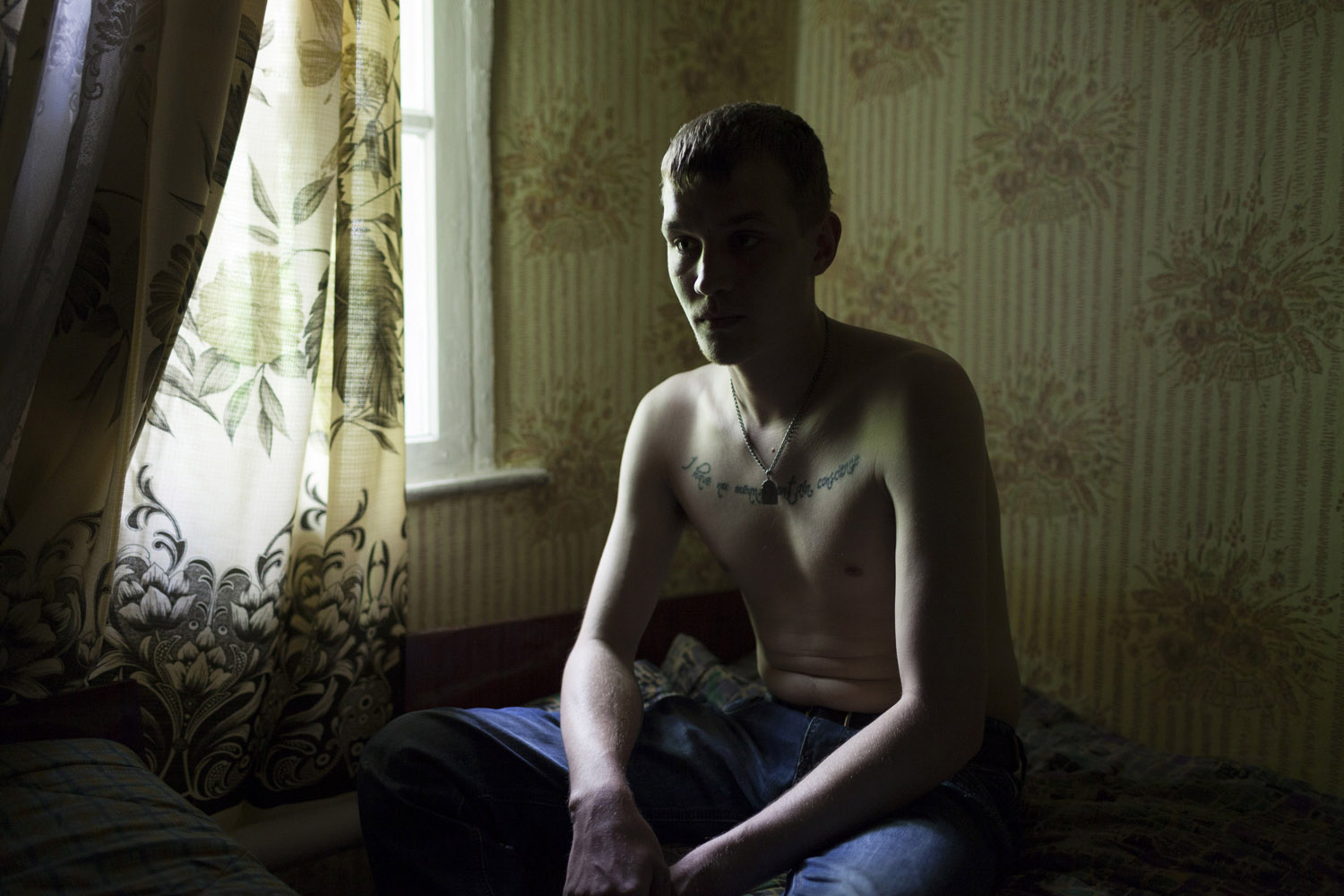
Photos by János Chialá & Tali Mayer.
Eastern Ukraine, 2014.
Dima is twenty years old, and puts on a bitter smile when he is asked what he wanted to do in life when he was a child. “I wanted to be an archeologist,” he says as he hands us a can of beer, “but my parents told me it would be much better if I managed to find a job in construction.” Then his mother died of a heart attack, his father committed suicide a year after that, and Dima had no more time: “I did the same thing my father did when he was young, I went to work in a mine. There is no other choice here.”
Dima lives on the outskirts of Donetsk, the capital of the Donbass coal-mining district in the east of Ukraine, just across the border from Russia. Except from a breathtaking countryside and a few rusty industrial towns, the region does not have much to offer to its inhabitants, especially when it comes to choices. In fact, for the vast majority there is but one job available, that of the coal miner. Above the surface, the Donbass is poor and underdeveloped, but its underground is rich in coal, forcing generation after generation of young men like Dima to embark on a life largely spent in the darkness, digging for the black gold.
Back in the times of the Soviet Union, industrial production was a national struggle and the miners of the Donbass were at its front lines, strenuously making their way through the earth to provide the fuel to keep socialism moving forward. It was here, in the year 1935, that Alexey Stakhanov mined more than two hundred tons of coal in one shift, becoming a enduring symbol of Soviet dedication to work. Dima was born long after that, yet he says with absolute certainty that things were better back then, when “miners were the backbone of a strong country, a country that needed them.” Hundreds of mines were established in the Donbass, attracting workers from all across the Soviet Union and bringing millions of Russians to this deserted region of Ukraine. Miners were celebrated as heroes of labour and given special benefits. “They could smoke where it was not allowed, and the state even gave them free milk to clean their lungs from the coal” continues Dima, “but most importantly, they were respected.”
The beer is over, but he won’t let us buy the next round – we are his guests, and he will pay for the drinks. Miners are still proud people, but their society and the coal mining industry have changed quite a lot since the times of the Soviet Union.
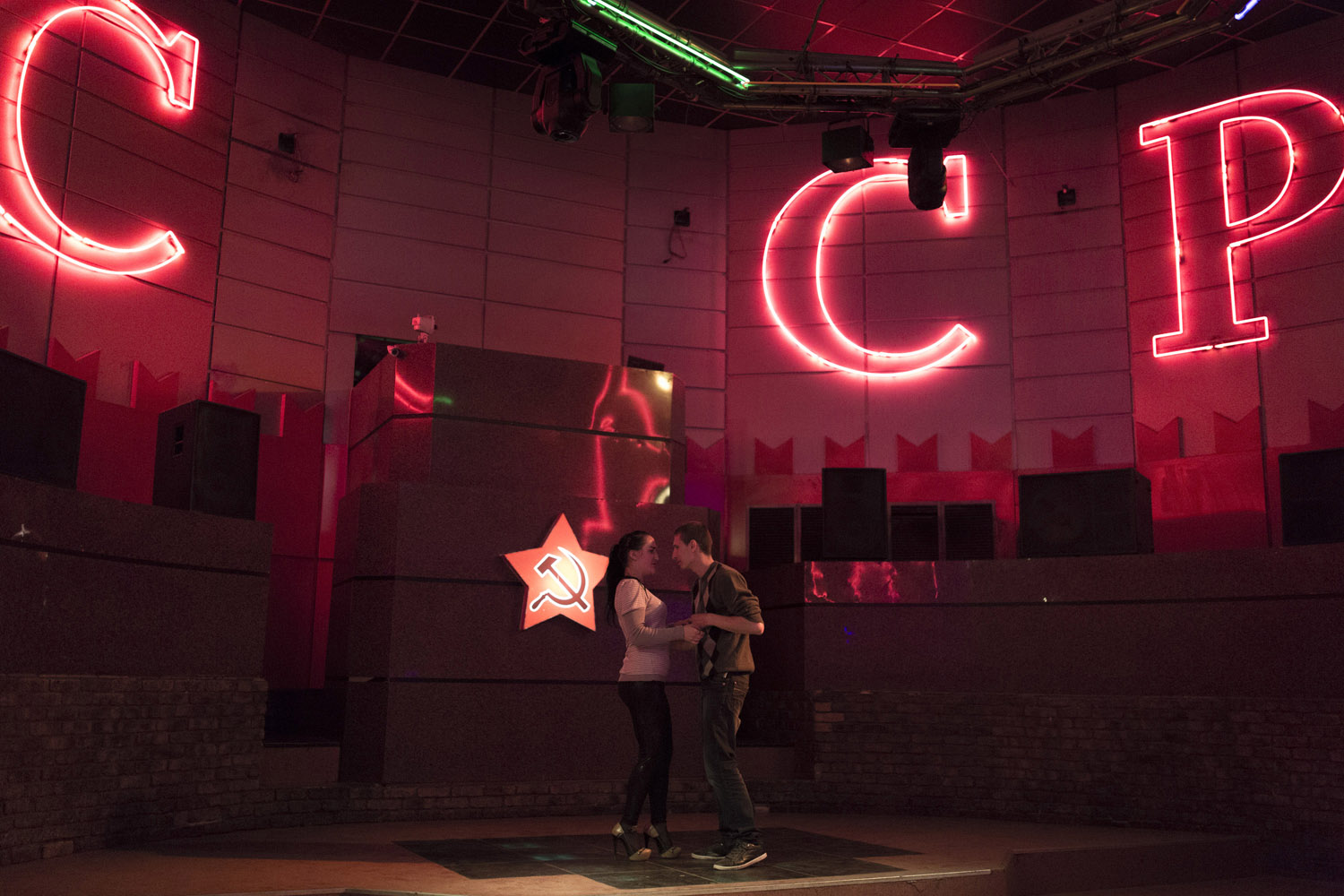
Ukraine is the only one among the former Soviet Republics whose economy actually shrunk since gaining independence, a decline that also took its toll on the country’s population, with seven million Ukrainians lost to emigration, high mortality and low birthrates.
For the people of the Donbass the break up of the Soviet Union has been just another episode in a long history of domination from afar and ruthless exploitation: corrupted socialism gave way to corrupted capitalism, leaving behind almost no trace of a functioning civil society and ushering another two decades of stagnation and mismanagement that saw dozens of coal mines close down, depressing the Donbass even further.
Whatever benefits the transition to a free-market economy brought, they either stayed in the capital city of Kyiv or in the hands of the new ruling party: the oligarchs. In a swift and brutal privatization, state assets and public resources were seized by mafia bosses and former party officials. In the Donbass, coal was the main prize, and everybody went for it: once the official mines became the private fiefdoms of this or that oligarch, local criminals begun taking over the countryside to dig their own, private mines.
It is in these illegal mines that most young men of Donbass end up looking for work. “You can’t get a job in a legal one if you don’t have the right connections,” 26-years old Boris tells us over a beer in Shakhtiorsk, a small town east of Donetsk whose name itself is a reference to the shakhta, the coal mines that employ the overwhelming majority of the local men. “It is also very difficult if you have a criminal record,” he adds, “and many of us have one. There is nothing to do here, so people drink and get in troubles.” He worked many years in illegal mines, until he saw too many of his friends die in accidents and was lucky enough to get a job on a ship, where he learned some English. He finds our interest in the young miners amusing. “Are you happy in your life?” he asks us, the first of many young miners who would ask this question, “you must be. It can’t be as bad as here.” After a few more drinks, he promises that he will try to help us, and warns us about wandering around the area alone. “People here don’t like strangers,” he says, “they probably have never seen one, and they leave this town. This is everything they know, and they don’t have much trust for what they don’t know.” We haven’t seen any other foreigner in days, or any policeman for that matter, so we decide to take his advice.
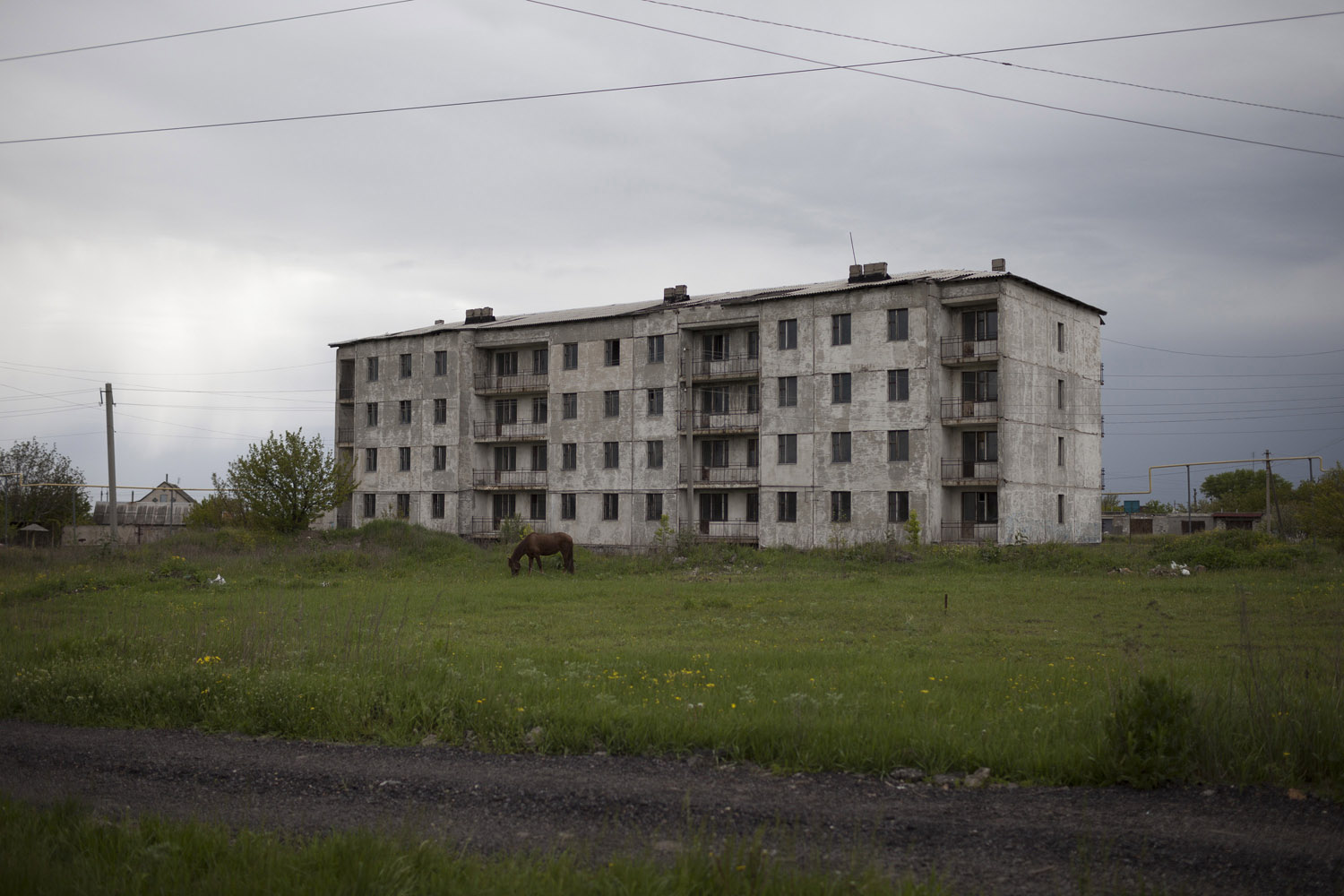
While miners in the official mines can look forward to a pension and enjoy a certain degree of protection, Boris’ friends are at the mercy of their bosses, and know that will not get any compensation in the case of injury of illness, two things that are almost taken for granted in a job in which every day might be your last. Sasha is Boris’ best friend, has worked in illegal mines for many years and looks quite depressed. “There was an accident, I got badly injured and was in a hospital for a month.” Since then he cannot work, “but the boss says the accident was my fault, and that I even own him money.” He has already spent all his savings on doctors, and now he does not know what to do except from drinking. Hoping to have us buy him a few beers to pass the day, Boris takes us to see an illegal mine, paying off the guardian to have him keep the dogs away from us. As we arrive, we notice the mine is closed. “There was explosion last week, four miners died,” the guardian tells us without showing any expression, “so the mine isn’t working now. But you can walk in if you like.” As we do walk in to get a glimpse of what it’s like inside, Boris’ voice echoes in the tunnel. ‘Welcome to hell, man.” The mine is but a plain hole in the ground, descending steeply into the darkness. There are no lights, the floor is wet and slippery, and several of the wooden supports that hold the ceiling have collapsed. “This is a good mine,” says Boris, “the ones I worked in were much worse.”
When asked, no miner will tell you that he likes his job. However, being a miner at least offers a measure of financial security if such a word can be applied to a job that takes place hundreds of meters below the ground, in unsafe and ageing mines that claim lives and limbs on a daily basis.
The day after we meet with another of Boris’ friends, Ivan, as he goes for his shift at 5:30 in the morning. He is 29, married and the happy father of a two-weeks old child. “Every day I go to work and I do not really know if I will come back alive,” he jokes while we drink a couple of beers in the morning sun. “Here in Ukraine, if you want something, you have to pay someone,” explains Sasha. In a country where the salary of a doctor can be as low as 90 euros a month, Sasha had to bribe a lot of people to get any medical treatment, just like he had to pay his boss to get the job in the first place. The same goes for everything else, in a perverse pyramid of corruption where everybody has to pay those above, and takes as much as possible from those below. Oligarchs are on top, and workers like Dima, Sasha and Ivan are at the bottom, practically under the ground. “Without money, you are simply nothing.”
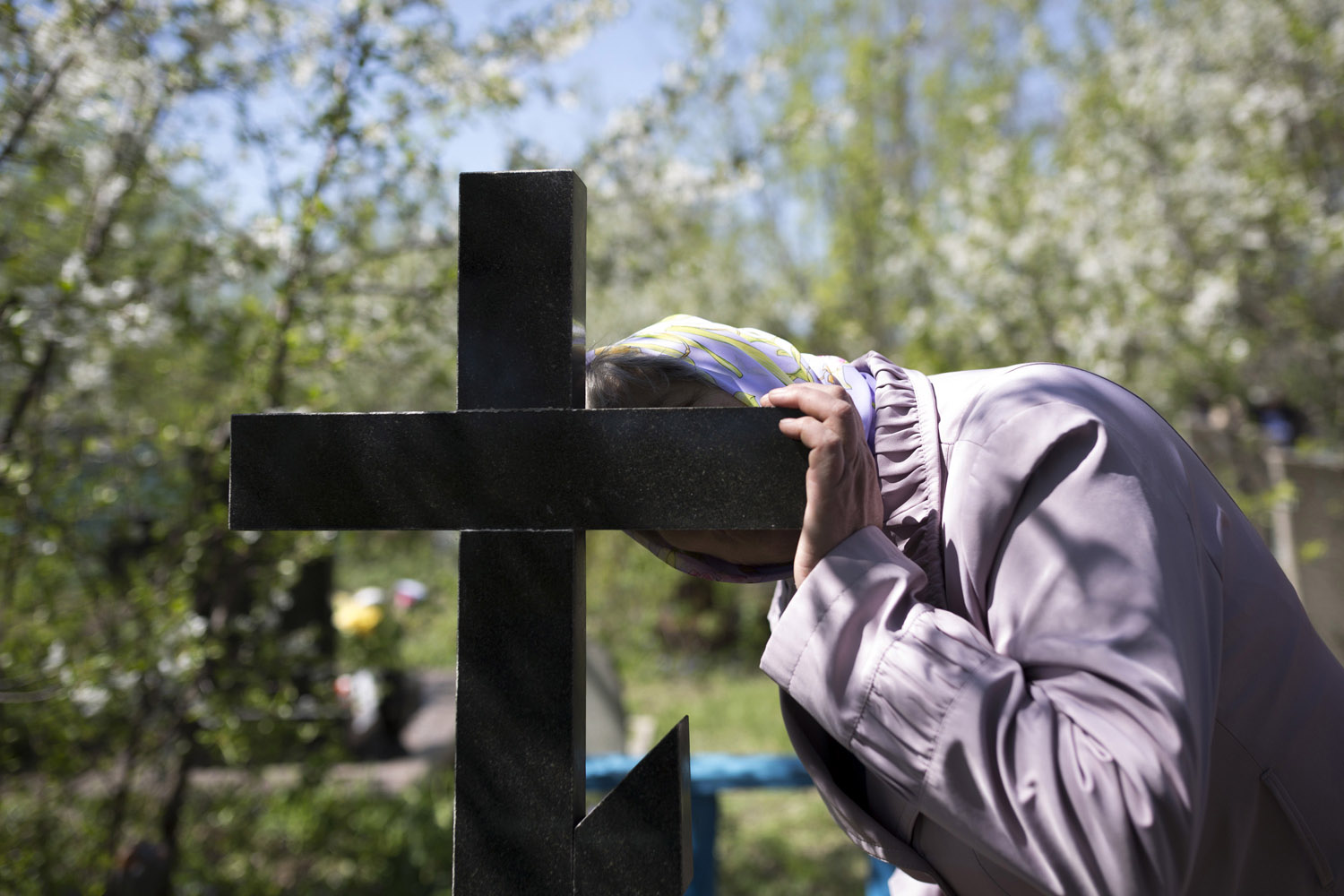
Inevitably, the young miners do not feel much attachment to Ukraine, a country they feel has never gave them anything. They speak, think and sing in Russian, and often complain of how the more westernised inhabitants of the rest of the country see them as ignorant menial workers, to be exploited and oppressed.
“The Donbass has always paid for all of Ukraine,” many of them say, “and they always ripped us off!” These feelings of alienation played an important role in sparking the pro-Russian separatist movement, together with the possibility of greater integration with Europe and the adoption of stricter mining standards that would have closed even more of the legal mines. Playing on the traditional mistrust of the corrupt government in Kyiv and the strong attachment to the Russian brothers across the border, the separatists took up arms and basically seceded the Donbass from Ukraine, leading to a low-intensity, frozen conflict that heavily affected the economy and cast a further pall of hopelessness and stagnation across the region.
Yet however disillusioned they might be, the young miners still wake up every morning to go to work, like Ivan is doing. We ask him if he isn’t afraid of not coming back alive. He downs his beer and laughs – “You do not ask this question to a Russian man.”
The following Sunday is the first after Easter, and it is tradition to visit one’s deceased relatives, having a picnic by the grave to reunite the family for a short time. In Shakhtiorsk’s cemetery, hundreds of tombstones have young faces on them, and many are decorated with miners’ helmets and other symbols of coal mining. At one point, a group of well dressed, tough-looking gathers around a grave, sitting silently as they drink from small bottles of vodka. “Are they miners?” we ask a woman who was telling us about her husband who died from silicosis, the lung disease that eventually kills the vast majority of miners who do not die in an explosion or a cave-in. “Oh, them. They are the exact opposite of miners,” and tells us to be quiet until they leave, hinting they were members of the mafia who had come to visit one of their fallen colleagues.
In the Donbass, miners are still seen as a symbol of honesty, those who take the long and hard way to provide for their families. Statues of miners still adorn many squares throughout the region, alongside the monuments to the other pillar of Donbass identity, the victory in the Second World War, or the Great Patriotic War as it’s called in the former Soviet Union. People here speak of that war as if it happened yesterday, often blending it with the harsh realities of coal mining of the current political turmoil in one great narrative of struggle and survival against all odds.
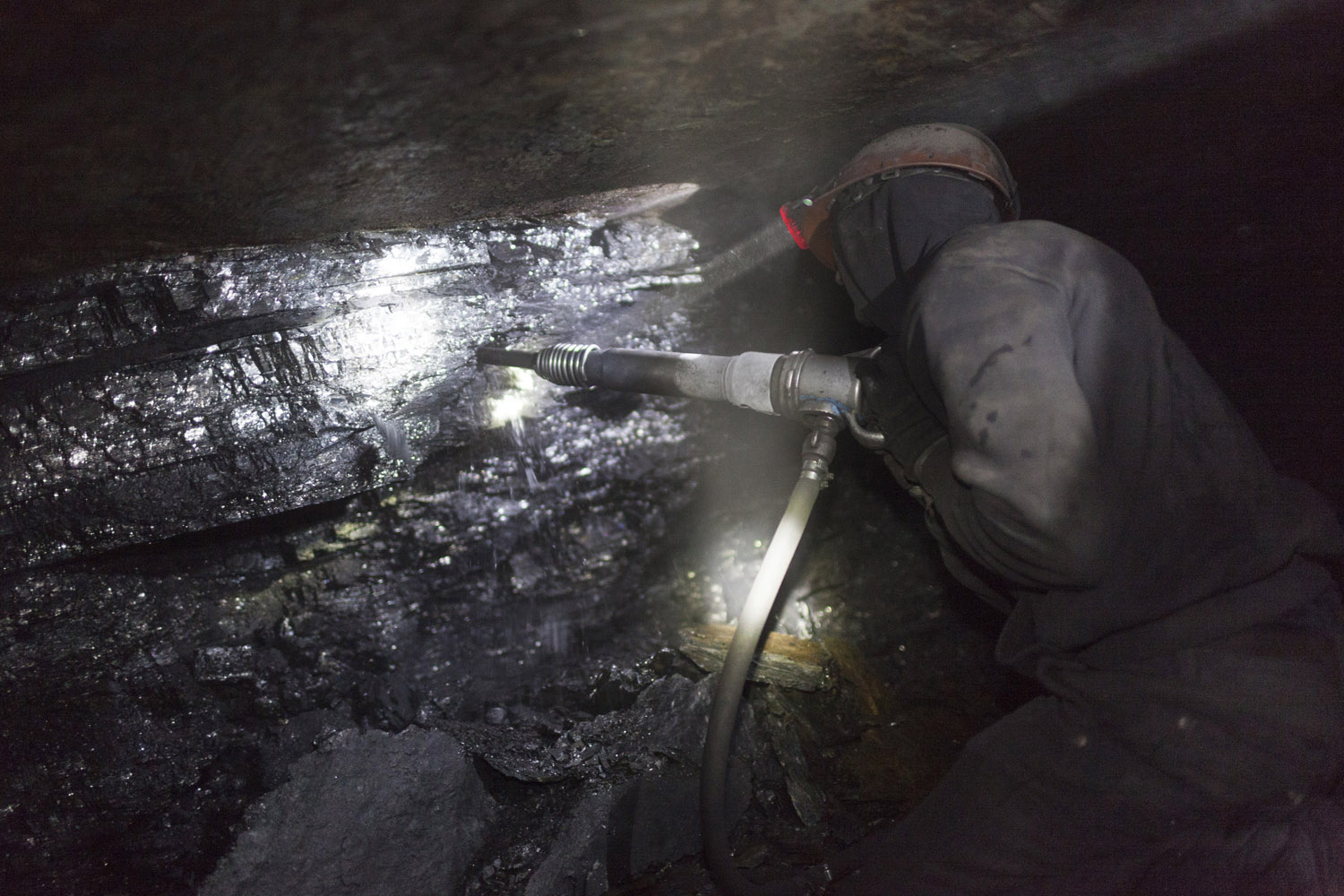
And the odds are definitely stacked against the young miners. As a result of work accidents, drinking and the heavy toll of a life of mining, most of their fathers are dead. The mothers have to work several jobs just to support themselves, and in the desert that is Ukrainian society, there are no institutions to turn to for support in getting an education.
Tolek, Marek and Tolek are three young miners from Davidovka, a small mining community deep in the countryside, surrounded by several terrikon, the mounds of excavated debris that marks the presence of a mine. The illegal mine they work in is a few hundred meters from their houses, and they want to show us what the work is really like. At the end of an eight-hour night shift, we meet and follow them him inside. The miners easily crawl down a steep, damp tunnel less than half a meter high, until we reach the bottom more than two hundred meters below. The job is simple: one miner breaks the rock with a jackhammer, filling the air with coal dust and making the whole tunnel shake, while the other shovels the coal into a bathtub, which is then hoisted to the surface where it is loaded onto trucks in a yard fenced off to keep intruders like us away. Tolek is nervous, he doesn’t think that his boss would like us being there. “They say the coal belongs to the country, but it’s not true. We wouldn’t work like this if it was true.” Without any contract or insurance, Tolek and his friends work five days a week for an average pay of less than 250 euros, depending on how much coal they mine and how many risks they take.
“Now that you have been in a mine, you must come to the lake,” Boris tells us the day after, “the miner’s life is not only about coal, my friend.” We meet with a few of his friends, and set out to the countryside. After several hours of walking in the baking sun, we arrive to one of the hundreds of beautiful lakes around the town. They can’t really explain why we came to this specific one, it’s just where they like to hang out although it might have something to do with the fact that the vast majority of these lakes are irremediably polluted by some old factory. Miners get a day off every two shifts, and many of them like to spend it fishing with their friends. There aren’t any fish to catch, but the scenery is beautiful and it doesn’t seem to matter. In a mine, every small noise might be the first sign of a deadly cave-in or of an explosion, keeping the miners always on the edge. “I just like to sit here and wait for nothing to happen,” explains Tolek, before going off to partake in the other main source of relaxation around here, the locally produced weed. “Miners work hard,” the miners often say, “and like to smoke harder. Only bongs.”
But no matter how many litres of warm beer and how many rounds of smoking, a certain tension is always in the air, made all the worse by our unsettling presence. When it was proposed to smoke joints for once, as a way to involve those like us “who aren’t strong enough for bongs,” another young miner got offended. He must have said something wrong, and Ivan swiftly shut his mouth with a couple of hard punches. “I had to do it, after what he said,” and then simply walked away. “Oh don’t worry, he learned a lesson. It’s not the first time,” was his conclusion.
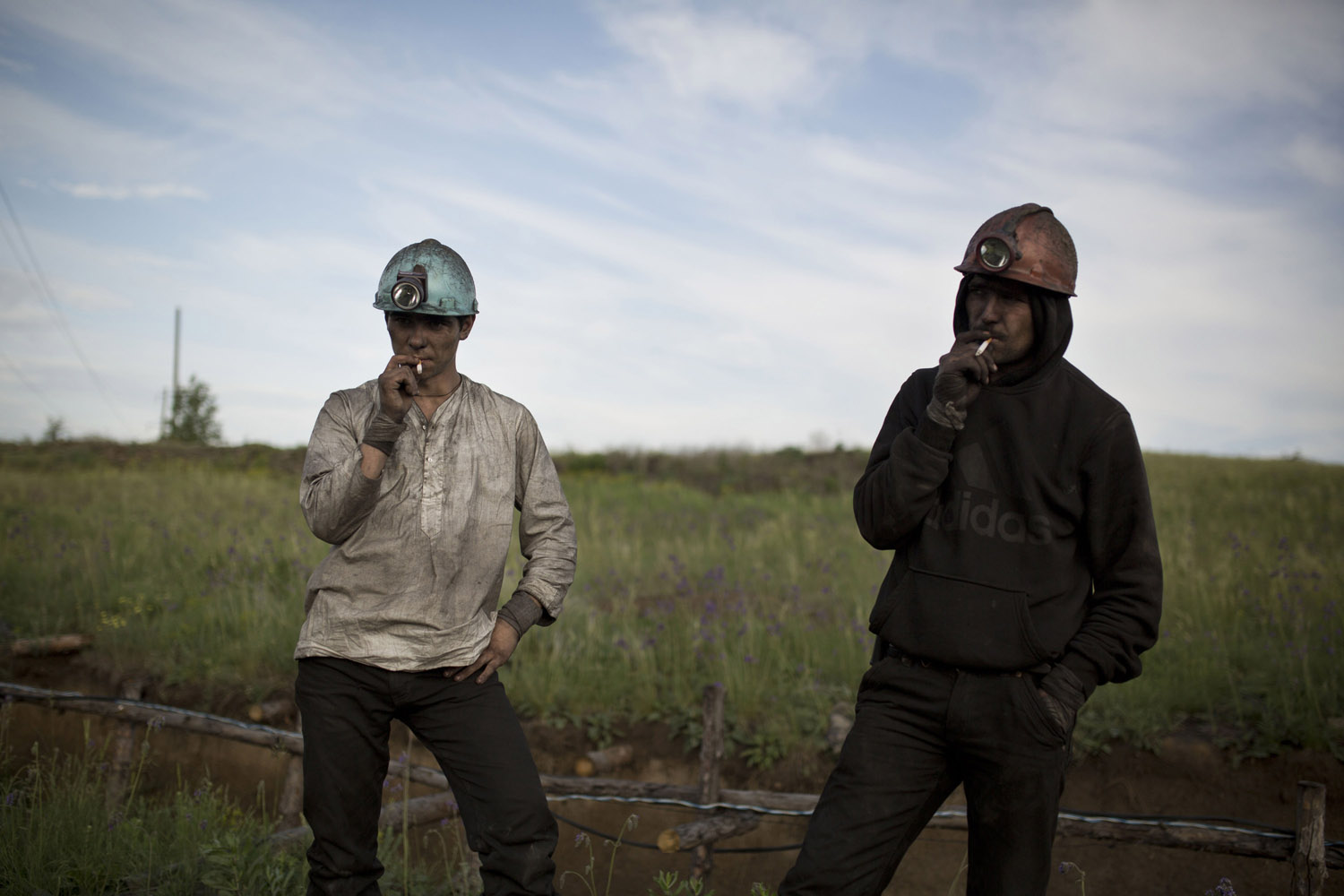
Vasily has a nice black car, and doesn’t know any photographers, journalists or pretty much anybody who is not a miner. He is twenty four years old and one of the lucky few to get a job in a legal mine. He shows us a picture of himself in his work uniform, and after a lot of beer accepts to let us take the same photo ourselves, when his next shift is over, “so you can see a real miner.” We are drinking beer in a parking lot in Shakhtiorsk, listening to Viktor Tsoy’s melancholic songs about alcohol and cigarettes playing out of the sound system on Vasily’s car. There are many other groups in the parking lot, drinking like us, and the floor is littered with empty beer bottles. Only boys can be seen, as the girls seem to stay largely away from the increasingly drunk young miners. Asked if a young miner would be a good choice for a girl to marry, Vasily laughs: “her parents would be sad, she wouldn’t get to see much of her husband. As long as he’s alive, anyway.”
When we show up at the mine the day after, Vasily’s face is completely black with coal and doesn’t look too happy either. He’s tells us this is going to get him in trouble with the management and tells us that normally he would never let some strangers photograph him. But among Russians, Vasily says grudgingly, “if you say, you must do – otherwise you are not a real man.”
Now that they are miners and they are real men, the young miners like to joke about the happier times when they dreamed of becoming archeologists, or of having their own business, “to make some real money.” The day before we leave, Tolek and Marek invite us to their house for farewell drinks. We tell them how nice it would be if one day they came to visit us, and also saw how we lived. “It’s not good to talk about things like this,” interrupts Tolek, “it will never happen. But come inside, I want to show you something.” He takes us to see a car engine he is putting back together. “Everybody here is a good mechanic, but I’m one of the best,” he adds, before pulling out a beautiful mask he carved out of wood and asking us to take a photo of it. In life he has learned to do many things, but what he would really like to do is becoming a carpenter. But he isn’t too optimistic about it – without any money and anybody to help him, it will most likely remain a distant dream, as will the dreams of many other miners. He will continue to work in a coal mine, and tells us that he hopes to still be around if we ever return to his village. This is the life of the miner, a life that nobody would choose if they had a choice, that choice that nobody ever offered to the young miners of the Donbass.
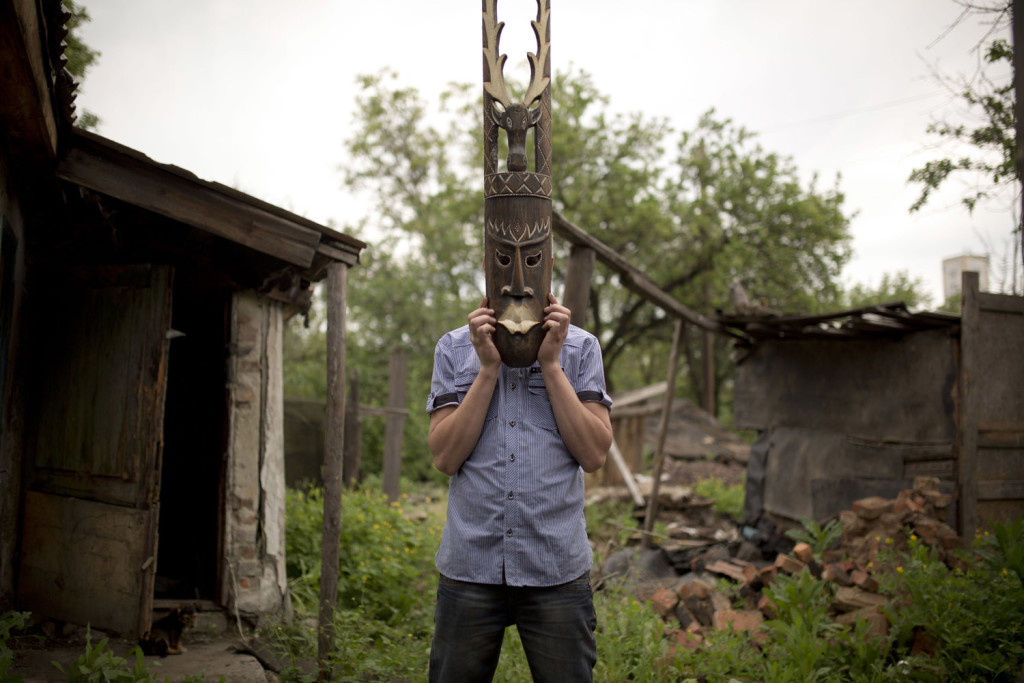
See all the photos here.